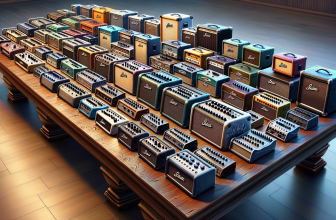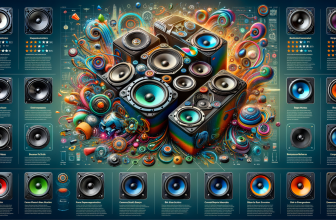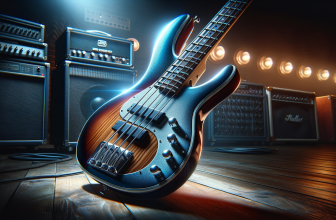
Wondering how to dive into the soulful world of harmonica music? The harmonica, with its rich history and distinct sound, has captivated musicians and audiences alike. If you’re a beginner, choosing the right harmonica can be your first step towards mastering this timeless instrument. But where exactly do you start?
Our Top Picks
Our #1 Top Pick: Hohner Special 20 Harmonica
The Hohner Special 20 stands out as the quintessential beginner’s harmonica. It boasts a plastic comb, which not only prevents it from swelling and shrinking with changes in humidity but also provides a comfortable playing experience. The reed plates are recessed into the comb, minimizing the chance of your lips getting caught during play. This harmonica is key of C, which is commonly recommended for beginners. Its reliable German craftsmanship ensures a quality instrument that provides crisp, rich tones, perfect for a variety of music styles.
Pick #2: Lee Oskar Major Diatonic Harmonica
Our second pick is the Lee Oskar Major Diatonic Harmonica. Renowned for its durability, this harmonica offers a clear and bright sound that works well whether you’re playing blues, folk, or rock. Its airtight design provides ease of bending notes, allowing beginners to explore a variety of sounds. The color-coded, replaceable reed plates make maintenance and customization simple for novice players.
Pick #3: Fender Blues Deluxe Harmonica
Fender is a name synonymous with quality in the world of music instruments, and their Blues Deluxe Harmonica maintains this legacy. This harmonica is designed for ease of play and features a classic tone that can slide into blues, country, or rock with ease. It’s also affordable, which makes it a great entry-level option for those who are just finding their footing without risking a significant investment.
Pick #4: Seydel Blues Session Standard Harmonica
The Seydel Blues Session Standard offers a smooth playing experience suitable for beginners. It features an ergonomic cover plate design which reduces moisture buildup and is comfortable to hold for extended practice sessions. The solid construction and stainless steel reeds are indicative of Seydel’s commitment to quality, promising a long-lasting harmonica with consistent performance.
Pick #5: JDR Harmonica Blues Key of C
The JDR Harmonica, in the key of C, is geared towards beginners and is especially budget-friendly. It sports a durable stainless steel cover and a copper reed plate, contributing to its nice sound and high-quality build. The harmonica comes with a case and a cleaning cloth, making it a convenient option for students or those who are always on the go.
What to Know Before You Buy
- Types of Harmonicas: Diatonic harmonicas are most suitable for beginners. They’re tuned to a specific key and are perfect for blues, rock, and folk. There are also chromatic harmonicas, but these are generally more complex and better suited for experienced players.
- The Key of ‘C’: The key of C is the most recommended for beginners because it’s the most widely used and is generally the key taught in beginner tutorials and songbooks.
- Build Quality: A harmonica with a plastic or wood comb is more comfortable and avoids swelling. Stainless steel covers are preferable as they are durable and prevent rust.
- Reed Material: Brass and bronze reeds are common, but phosphor bronze reeds have greater durability and produce a richer sound.
- Maintenance and Care: Basic maintenance includes keeping the harmonica clean and dry. Some models provide replaceable reeds, which can be more cost-effective in the long run.
Factors to Consider Before Buying
- Cost: While it might be tempting to go for the cheapest option, invest in a mid-range harmonica for better sound quality and durability. This doesn’t mean you have to break the bank, but don’t compromise on quality.
- Comfort: The harmonica should feel comfortable in your hands and mouth. Look for rounded edges and a smooth build to avoid discomfort during practice.
- Tuning: Make sure the harmonica is accurately tuned. Poorly tuned harmonicas can lead to a frustrating learning experience.
- Brand Reputation: Choose brands with a proven track record for quality harmonicas. This will ensure that you’re getting a reliable instrument as a learner.
- Accessories: Look for harmonicas that come with a case and cleaning cloth, to help in maintaining and protecting your instrument.
- Teacher’s Recommendation: If you have a harmonica teacher, ask for their recommendations based on their experience in teaching beginners.
Why Trust ChooseRight?
Our commitment to helping you choose the right instrument for your music journey is backed by in-depth research and analysis. We’ve taken the time to review countless products, read through thousands of reviews, and sought feedback from professional musicians to formulate our list of top harmonica picks for beginners. Rest assured that our recommendations come from a place of extensive knowledge, ensuring that we provide you with the best possible advice for selecting your beginner’s harmonica.
Finishing Thoughts
Embarking on a musical journey with the harmonica is an exciting endeavor, and choosing the right instrument is a critical step in ensuring a delightful and educational experience. Remember to consider factors like the type of harmonica, key, build quality, and comfort before making your purchase. As you’ve read in our top picks, there are harmonicas to suit every beginner’s needs, from the exceptional Hohner Special 20 to the budget-friendly JDR Harmonica. Trust your instincts, and the sound that speaks to you, and you’ll be well on your way to producing melodies that touch the soul. Enjoy your harmonica journey!
Frequently Asked Questions
What is a good harmonica brand for beginners?
Several harmonica brands are well-regarded for beginners, including Hohner, Lee Oskar, and Seydel. Specifically, the Hohner Special 20 and the Lee Oskar Major Diatonic are popular choices for those just starting out.
Should beginners start with a diatonic or chromatic harmonica?
Beginners are generally recommended to start with a diatonic harmonica. It is easier to play and learn on due to its simpler structure and is commonly used in a wide variety of music genres.
What key should a beginner’s harmonica be in?
The key of C is the most recommended for beginners because it is a natural key with no sharps or flats, making it easier to follow instructional materials, which are often based in this key.
Are expensive harmonicas better for beginners?
While high-quality harmonicas tend to be more expensive, there are very good beginner harmonicas available at an affordable price. It’s more important for a beginner to start with an instrument that is easy to play and tuned accurately than to invest in a professional-grade instrument right away.
Can a cheap harmonica be good for learning?
Affordable harmonicas can be suitable for learning, but be wary of very cheap options as they may be poorly made, out of tune, and hard to play. Look for a harmonica from a reputable brand, which often guarantee a minimum level of quality even in their budget models.
How many holes should a beginner’s harmonica have?
Standard diatonic harmonicas, which are recommended for beginners, typically have 10 holes.
Are there specific harmonica models designed for children?
Yes, there are harmonicas designed for children. These models are often smaller, more colorful, and easier to handle. However, a standard 10-hole diatonic harmonica is also suitable for older children and teenagers.
How long does it typically take to learn the basics of playing the harmonica?
The time it takes to learn the basics can vary greatly depending on the individual. With regular practice, a beginner can often play simple tunes within a few weeks. Mastery of more advanced techniques will take longer.
Do I need to be able to read music to play the harmonica?
No, it is not necessary to read music to play the harmonica. Many players learn by ear or use tablature, which is a simpler system of notation specific to the harmonica.
What accessories do I need as a beginner harmonica player?
In addition to your harmonica, it might be helpful to have a carrying case, a cleaning cloth, and a harmonica holder if you plan to play with other instruments. Instructional books or apps can also be beneficial for self-teaching.







